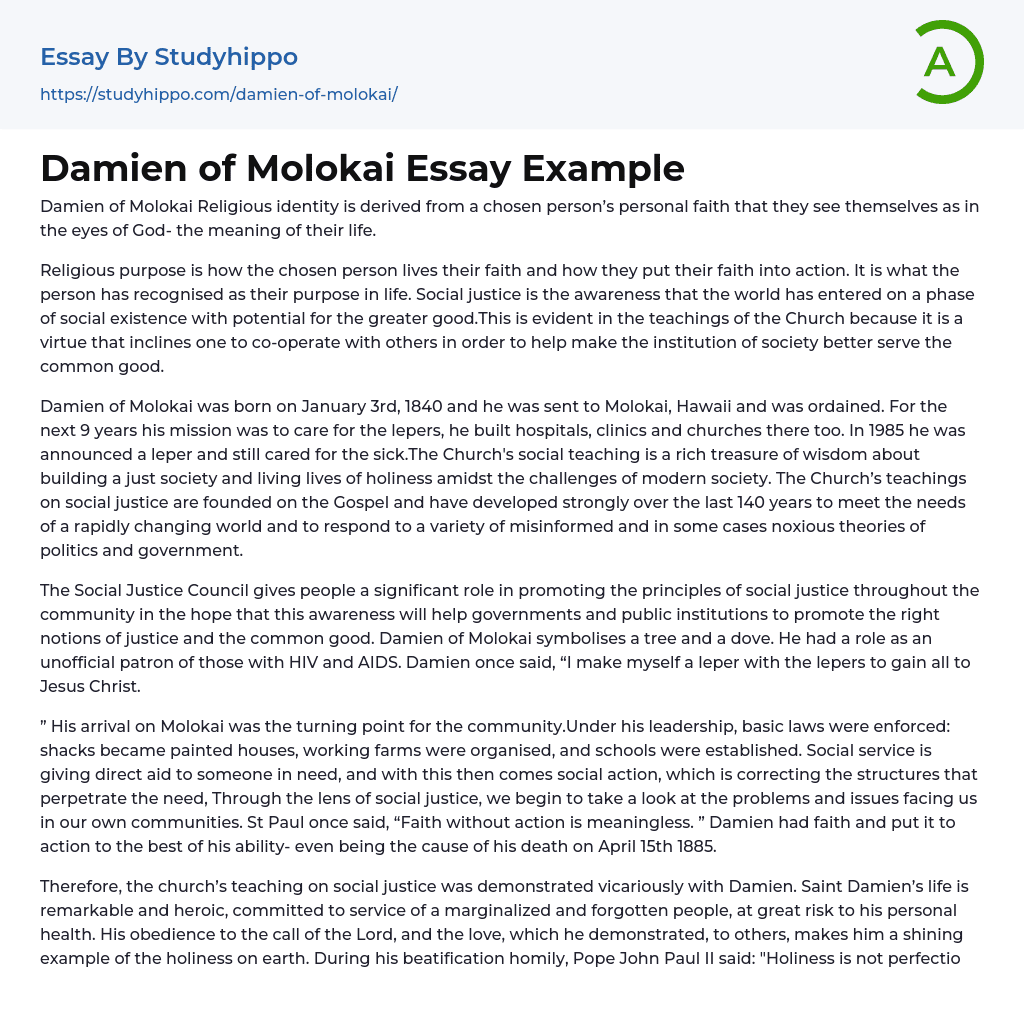The meaning of one's life as seen through the eyes of God is what determines their personal faith and religious identity, such as that of Damien of Molokai.
Religious purpose refers to the ways in which an individual lives out their faith and puts it into practice, representing their recognized purpose in life. The concept of social justice is crucial as it recognizes the social phase of existence and its potential for good. This is emphasized in Church teachings as a virtue that promotes cooperation with others to improve society and advance the common good.
On January 3rd, 1840, Damien of Molokai was born and later sent to Molokai, Hawaii where he became ordained. For 9 years, his mission was to care for the lepers by constructing hospitals, clinics, and churches. Despite being diagnosed as a leper in 1985, Damien continued
...to provide care for the sick. The Church's teachings on social justice are grounded in the Gospel and have evolved over the past 140 years to address the challenges of contemporary society and to counter misguided and harmful political and governmental theories. Thus, the Church's social teachings offer a valuable repository of wisdom for cultivating a just society and pursuing holiness in our lives.
The Social Justice Council aims to involve individuals in advocating social justice principles within the community. Through this effort, the Council hopes to raise awareness that would encourage governments and public institutions to uphold just and equitable standards for the greater good. One of the key figures that serves as an emblem of this cause is Damien of Molokai. Often identified as a tree and a dove, Damien supported those living
with HIV and AIDS as an unofficial patron. He once expressed his devotion to serving others by declaring, "I make myself a leper with the lepers to gain all to Jesus Christ."
Under his leadership, Damien transformed the Molokai community. Basic laws were enforced, shacks were turned into painted houses, organized farms, and schools were established. Damien's actions exemplified the concept of social service, providing direct aid to those in need. However, he also recognized the importance of social action, correcting the underlying structures that perpetuate such needs. His efforts reflect a commitment to social justice and to addressing the issues facing communities. As St. Paul emphasized, faith must be accompanied by action - a belief that Damien embodied until his death on April 15th, 1885.
Despite his personal health being put at risk, Saint Damien exemplified the church's teachings on social justice through living a remarkable and heroic life of service to marginalized and forgotten individuals. His love and obedience to the Lord make him a shining example of holiness on earth. Pope John Paul II's beatification homily states that holiness is not limited to exceptional individuals but can be achieved by anyone willing to collaborate in the salvation of the world for God's glory, despite sin or rebellious temperament. Damien saw Christ in everyone and treated them accordingly.
Damien aimed to be present and united with others by actively engaging in social justice issues, driven by his strong religious beliefs which emphasized selflessness and service to others. These beliefs eventually led him to be honored by the church as a "blessed" due to his holy life. His tireless efforts to assist the sick on Molokai
encompassed both their physical and spiritual needs, reflecting their need for God’s love to sustain them.
Damien of Molokai's relationship with God influenced his work on religion, which consisted of daily mass, dispensing sacraments of Penance, Matrimony, the sacrament of the sick and inspiring people through the adoration of the Holy Eucharist. He was a compassionate and energetic man of action who felt the need to improve the lives of lepers banished to the Hawaiian island of Molokai. His selfless work was radically generous and changed the lives of lepers significantly.
Damien's religious identity and purpose made him a powerful exemplar of a Good Samaritan or a "servant of Humanity," influencing both his life and work on behalf of others.
- Baptism essays
- Holy Spirit essays
- Jesus Christ essays
- Adam And Eve essays
- Crucifixion Of Jesus essays
- Crusades essays
- Eucharist essays
- God The Father essays
- Pope essays
- Protestantism essays
- Christian essays
- Church essays
- Elizabeth essays
- Sacrament essays
- Catholic Church essays
- Lord essays
- Priest essays
- Protestant Reformation essays
- Afterlife essays
- Atheism essays
- Bible essays
- Buddhism essays
- Christian Worldview essays
- Christianity essays
- Confession essays
- Cosmological Argument essays
- Deism essays
- Devil essays
- Existence of God essays
- Faith essays
- Freedom Of Religion essays
- God essays
- Hinduism essays
- Immortality essays
- Islam essays
- Jainism essays
- Jews essays
- Judaism essays
- Miracle essays
- Monk essays
- Monotheism essays
- New Testament essays
- Old Testament essays
- Pilgrimage essays
- Puritans essays
- Revelation essays
- Ritual essays
- Salvation essays
- Sin essays
- Sinners essays




